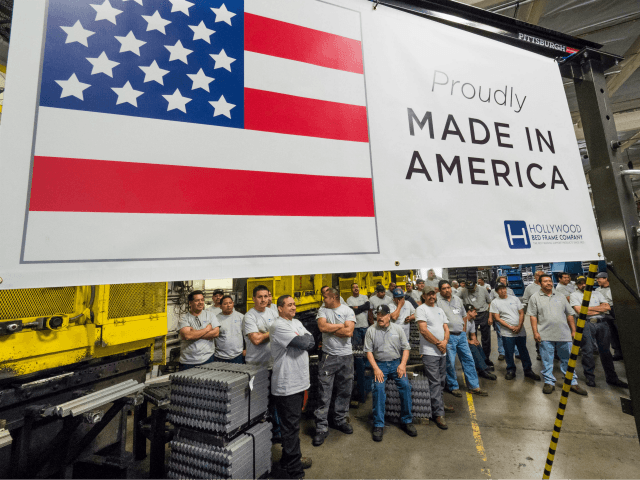American manufacturing jobs have boomed to a more than 20-year high as President Trump has imposed a wide range of tariffs on imported steel, aluminum, and Chinese products — dooming predictions made by free traders that have yet to pan out.
U.S. manufacturers added 284,000 jobs in the last year, the most jobs added in the sector in a single year since 1997, as Breitbart News’s Economics Editor John Carney notes. In December 2018, alone, about 32,000 factory jobs were created.
American manufacturing is vital to the prosperity of communities, as every one manufacturing job supports about 3.6 American jobs in other sectors of industry.
The U.S. manufacturing jobs boom comes as free trade economists, billionaire donors, and establishment media pundits have routinely claimed that Trump’s 25 percent tariff on imported steel and ten percent tariff on aluminum would cripple the American economy.
They said Trump's promise to bring back manufacturing jobs was a "con," told us we were dupes for believing in a manufacturing revival.
It just couldn't be done. It was impossible.
But we're America. The impossible country. So we did it anyway.https://t.co/GnWXcDCq0P pic.twitter.com/Kp3TAGJ1dB
— John Carney (@carney) January 4, 2019
In November 2018, the U.S. Chamber of Commerce wrote a letter to U.S. Trade Representative Robert Lighthizer claiming that Trump’s tariffs on imported products “endangers the jobs of millions of workers” in industries that have grown to rely on cheap foreign imports.
Months ago, the chairman of Cummins, a fortune 500 company, wrote an op-ed in the New York Times claiming that even short-term tariffs would cripple American industry.
“We see no upside in the implementation of tariffs,” Cummins Chairman Tom Linebarger wrote. “They are a tax, and the risky proposition of entering a trade war could slow down the economy. Even putting up short-term barriers with trading partners in China and Europe can cause long-term losses in market share, resulting in lost jobs in the United States.”
The free traders at the Tax Foundation wrote their research predicted that not only would Trump’s tariffs crush American industries, but they would also decrease Americans’ wages.
“These tariffs increase production costs for U.S. manufacturers, placing them at a competitive disadvantage, and will, on net, destroy more output, wages, and employment in the United States than they create,” Tax Foundation analysts wrote.
For U.S. wages, the opposite has panned out. In December, Americans’ wages grew 3.2 percent in December 2018 compared to last year.
The conservative Heritage Foundation called Trump’s tariffs “ineffective and dangerous,” elected Republicans have called the tariffs “dumb,” and pro-free trade Trade Partnership claimed that the tariffs would eliminate 146,000 American jobs, a claim that has yet to come to fruition.
Alliance for American Manufacturing President Scott Paul credited Trump’s tariffs for the economic boom in U.S. manufacturing, telling Breitbart News in a statement:
December was another great month for manufacturing. With 32,000 new jobs last month, tough action against trade cheats is helping create new jobs for American workers. [Emphasis added]
Paul said the new Democrat-Republican split Congress should now focus its attention on a massive infrastructure investment to continue driving American manufacturing and job creation.
“With more manufacturing jobs, communities throughout the country grow,” Paul said.
As Breitbart News has extensively reported, between 2001 and 2017, the U.S.-China trade deficit was responsible for the loss of 3.4 million American jobs. The vast majority of jobs lost from free trade with China have been in the U.S. manufacturing sector, making up 74.4 percent of all jobs lost and amounting to 2.5 million U.S. manufacturing jobs lost. This total of jobs lost also includes the 1.3 million American jobs lost since 2008.
One former steel town in West Virginia lost 94 percent of its steel jobs because of NAFTA, with nearly 10,000 workers in the town being displaced from the steel industry.
John Binder is a reporter for Breitbart News. Follow him on Twitter at @JxhnBinder.

COMMENTS
Please let us know if you're having issues with commenting.